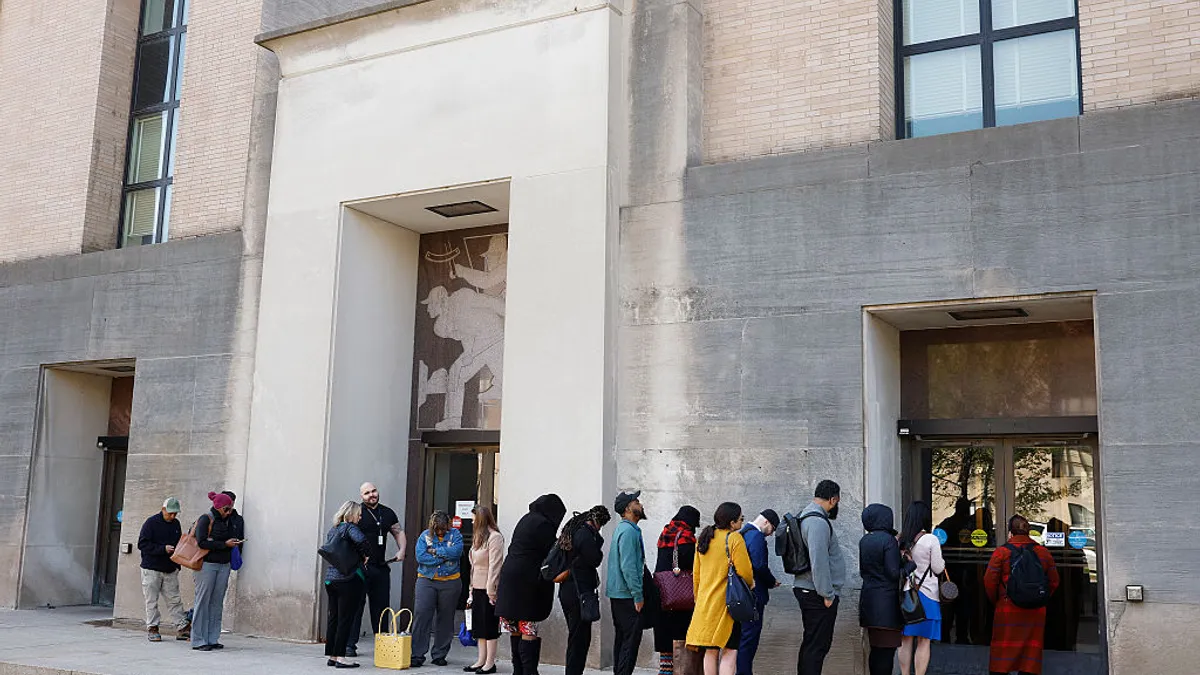Blame the uncertainty of an election year, stricter regulations or the long tail of the COVID-19 pandemic, but smaller deals have dominated pharma M&A in 2024. In fact, not a single deal announcement outside of the manufacturing plays by GLP-1 makers has surpassed $5 billion this year.
Still, M&A remains a critical cog in the biopharma machine, refilling mature pipelines with new drug candidates and giving smaller biotechs financial and structural support to bring medications to market. It’s just happening at a smaller scale.
As 2024 reaches its final months, deals like Pfizer’s $43 billion purchase of antibody-drug conjugate maker Seagen last year or Amgen’s $27.8 billion acquisition of rare disease company Horizon Therapeutics in 2022 have been nonexistent. Even the dealmaking valley of 2021 had a couple announcements worth more than $10 billion.
With one notable exception — Gilead’s $4.3 billion purchase of liver disease company CymaBay — most matchups this year have focused on new modalities in the mainstay areas of oncology and immunology, while neuroscience has seen a resurgence.
Here’s a look at what’s happened so far this year in pharma M&A.
Immunology
Vertex Pharmaceuticals’ purchase of Alpine Immune Sciences for $4.9 billion in April is still the biggest deal of the year. It was also the largest ever for Vertex, known as a relatively conservative acquirer, which speaks to the value in Alpine’s lead immunology prospect povetacicept for the kidney filtration disease IgA nephropathy.
At the time, Vertex in a press release called the candidate a “pipeline in a product” — a common long-term growth strategy for immunology drugs.
And like many biotechs in the years since the pandemic, Alpine was running low on cash as costly clinical trials had “exceeded our expectations,” the company said in an SEC filing last year.
Meanwhile, Eli Lilly’s $3.2 billion acquisition of immunology biotech Morphic in September cemented the therapeutic area as a focus of this year, driving home the need for new blockbusters in inflammatory bowel diseases like ulcerative colitis and Crohn’s.
With patent cliffs for IBD mainstays like Humira and Stelara cutting deeply into sales for AbbVie and J&J respectively, Lilly is banking on Morphic’s oral therapies to deliver the next wave in immunology.
Rounding out the larger immunology deals this year were acquisitions by Sanofi, J&J and Biogen. For Sanofi, a $1.7 billion purchase of Inhibrx marked a more targeted immunology play for the rare disease alpha-1 antitrypsin deficiency, while J&J’s acquisition of Yellow Jersey Therapeutics for a little more than $1 billion lassoed a therapy for the more common atopic dermatitis.
And in a move similar to Vertex, Biogen’s deal to buy HI-Bio, also for just over $1 billion, demonstrated that IgA nephropathy is an area pharma business development leaders have had their eye on.
Oncology
Cancer treatments remain a central pillar for the biopharma industry and the improvement of more precise modalities has driven a great deal of M&A.
More deals above $1 billion have been in cancer than any other therapeutic area, and Novartis was behind two of them. After a February deal to buy MorphoSys for just under $3 billion to secure drug candidates that include the small molecule pelabresib for a type of blood cancer, the Swiss pharma giant followed it up in May with the announcement that it would acquire preclinical radiopharmaceutical drugmaker Mariana Oncology for a longer-term investment of $1 billion.
AstraZeneca also bet on the burgeoning field of radiopharmaceuticals with a $2.4 billion purchase of Fusion Pharmaceuticals in March. Fusion’s mid-stage prostate cancer drug candidate offers a more targeted approach to the radiotherapy that as many as half of all cancer patients receive during their treatment, according to a release from AstraZeneca.
Ono Pharmaceutical, J&J and Genmab also stepped up in cancer this year by striking deals worth more than $1 billion.
Neuroscience
As central nervous system drug research makes a comeback, it’s once again an attractive target for Big Pharma, which was demonstrated most notably in Bristol Myers Squibb’s $14 billion purchase of Karuna Therapeutics last year that has resulted in a major approval of the schizophrenia drug Cobenfy.
While 2024’s deals are less weighty, those worth pointing out include Lundbeck’s $2.6 billion acquisition of Longboard Pharmaceuticals to secure the late-stage anti-seizure drug bexicaserin and AbbVie’s $1.4 billion deal to join the Alzheimer’s disease fray with a drug candidate from Aliada Therapeutics that targets amyloid plaques in the brain.



















